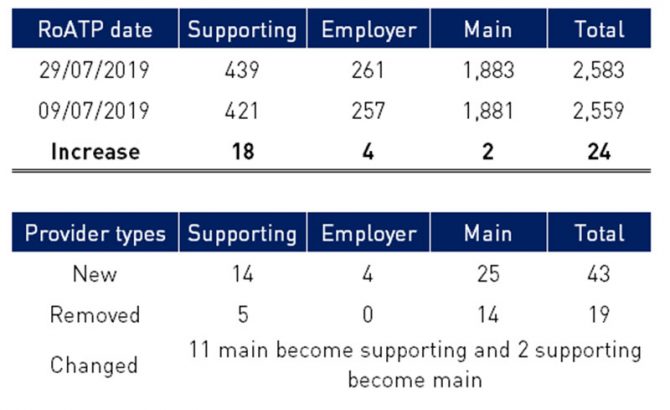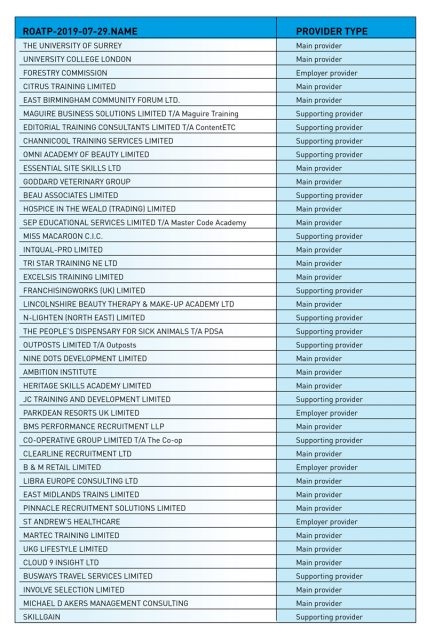FE providers have shown great promise in Ofsted inspections this week, except for one national waste disposal employer which made ‘insufficient progress’ in two areas.
Biffa Waste Services, which currently has 21 apprentices, had not ensured it met the requirements of successful apprenticeship provision in its first monitoring visit since it won a direct contract with the ESFA.
Inspectors wrote their implementation of their sole standard, the level 2 large goods vehicle programme, was “weak”, and Biffa does not ensure apprentices all over the country receive their full entitlement to off-the-job training.
“At too many depots, local managers allow the operational demands of the business to take precedence over the apprentices’ need to have time to train and study,” which has led just over a third of learners to withdraw, the report reads.
Their slow progress was further delayed when a subcontractor delivering functional skills went bust, so learners were not being prepared for their tests.
Biffa used to have 40 apprentices on a customer service practitioner standard, but these were withdrawn from the programme in November 2018.
A spokesperson told FE Week the company was “disappointed” with the outcome.
“We will be taking Ofsted’s recommendations on board and will review our training procedures to ensure that our schemes are delivered in line with Ofsted’s guidelines.”
An almost completely opposite result was made by fellow employer provider Leonardo MW, an Italian manufacturer of goods such as helicopters and electronic military systems, which has 75 apprentices and made ‘significant progress’ in all three areas of the inspection.
Inspectors praised the provider for setting very high standards for apprentices to meet the exacting standards of the aviation industry.
Thanks to high-quality on-the-job support provided by highly-skilled trainers and work supervisors, apprentices make rapid progress and are well-prepared for their end-point assessment because managers with considerable engineering experience assist awarding organisations to develop the engineering standards and assessments.
HCUC (Harrow College & Uxbridge College) had its first monitoring visit since it was formed from a merger of the grade one Uxbridge College and the grade three Harrow College.
Happily, Ofsted found it to be making ‘significant progress’ in two areas and ‘reasonable progress’ in three.
Its leaders are “ambitious” for the future of the general FE college, and are updating one of its estates to ensure all sites are of a high-quality, and have upgraded technology resources – a priority for one of the sites.
Staff across both colleges have developed a set of agreed and “essential” shared values, which “include a commitment to excellence and to having high expectations for their learners”, according to inspectors.
Another provider that has shown signs of progress from a previous grade three is Buckinghamshire UTC.
Since that inspection, there have been some changes to the governing body, the senior leadership team has been restructured and a high number of teachers have left and have joined the college.
In a letter to principal Sarah Valentine after a monitoring visit, inspectors said she knows the 14 to 19 provider well and, with the governors’ help, is “determined to make it as effective as you can to improve the life chances of the young people”.
Specialists from a teaching school have been working with the UTC to improve the quality of teaching and learning to a consistent level, and there is evidence of emerging success.
While learners passed comment on some variances in the quality of teaching, the watchdog told Valentine it had found they are “positive about the differences you have made as principal during their time at the school”.
Specialist college Royal Mencap Society, however, scored a grade three at its very first inspection.
The inspectorate found the college, which provides to learners with a learning difficulty, disabilities or an autism spectrum disorder, does not collate attendance data and staff do not have accurate information about apprentices’ and learners’ progress.
The report also says leaders and managers “have not ensured teachers have the qualifications and knowledge to help apprentices and learners to develop their English and mathematics skills”.
Elsewhere, a number of providers were found to have made ‘reasonable progress’ in all areas: Cornwall Marine Network, Freshfield Training Associates Ltd, Hct Group, Jag Training Limited, Phx Training, SR Supply Chain Consultants, Oxford University Hospitals Nhs Foundation Trust, Anglia Ruskin University, and Canterbury Christ Church University.




